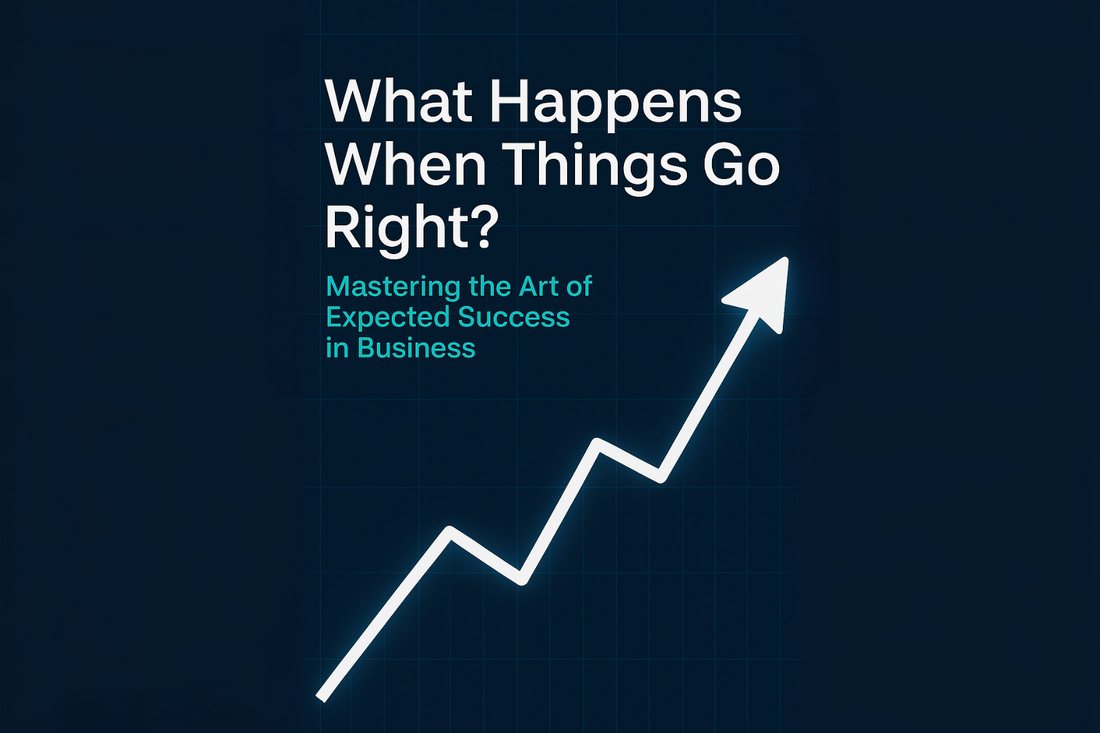
What Happens When Things Go Right? Mastering the Art of Expected Success in Business
Share
Imagine watching a SpaceX Starship launch. They're not just hoping to reach orbit. They're deliberately pushing the envelope by stripping away heat shield panels or tweaking designs mid-test. Why? They have an expectation of success.
Everyone up and down the chain of command trusts that the Starship will perform as expected, and so they’ve planned tests to push for greater results just in case things do go right.
A routine flight isn't the endgame; it's the foundation for bolder experiments that unlock unprecedented results, like reusable rockets revolutionizing space travel. This mindset of anticipating success allows them to test extremes and accelerate toward Mars colonization.
This is a perfect example of a rare leadership quality that needs more attention. Too many leaders fixate on disaster scenarios; what if the market tanks, the supply chain breaks, or competitors undercut us? This defensive posture limits growth breeding caution instead of innovation.
But what if things go right? Without an expectation of success, you miss the chance to push boundaries and compound wins into exponential returns. Drawing from my frontline experiences with executives at billion-dollar companies, let's explore why this oversight holds teams back and how to flip the script for breakthrough performance.
The Trap of Defensive Thinking: Why Focusing on Failure Limits Your Potential
In business, risk management is well understood; planning for downturns keeps you alive. But overemphasizing what can go wrong creates a culture of doubt, where success feels like a fluke rather than the norm.
- The Surprise Element: When a deal closes or a product launches flawlessly, teams scramble because victory wasn't the baseline assumption. This hesitation squanders momentum. With no success plan in place, extra capital is often wasted and lost on disorganized and spur of the moment investment decisions.
- Real-World Constraints: I've seen high-revenue firms hit targets consistently only to stall, unable to scale because their plans stopped at "survive" instead of "thrive."
- The Limiting Cycle: Constantly guarding against pitfalls discourages bold moves, much like a SpaceX team that never risks advanced tests for fear of basic failure.
This approach caps your upside, turning potential game-changers into missed opportunities.
Cultivating an Expectation of Success: The Foundation for Bold Innovation
Top leaders don't wait for wins. They demand them as the default. This shifts your organization from reactive defense to proactive offense, inspiring teams to reach higher.
- Inspiring Unwavering Confidence: Frame goals as inevitable: "We'll dominate this quarter, unlocking funds for our next acquisition." This replaces skepticism with a success-oriented drive.
- Cultural Transformation: Like SpaceX's iterative ethos, expected success encourages experimentation. Teams innovate freely when failure isn't the looming shadow.
Without it, even capable groups underachieve, trapped in a web of "what-ifs."
Planning for Victory: How to Push Boundaries and Amplify Returns
Expecting success isn't wishful thinking, it's the gateway to stacking achievements. Tie today's wins to tomorrow's leaps, ensuring every milestone fuels greater impact:
- Visionary Goal-Setting: Link immediate objectives to bigger plays. For example, "This $15M deal funds our acquisition of Company XYZ, opening a new $30M market."
- Avoiding Stagnation: Without forward plans, successes fizzle. Leaders miss synergies like reinvesting in tech or talent to outpace rivals.
- Scale faster: With clearly defined plans in place ahead of time, wins quickly turn into investment that turn into greater wins. This flywheel effect leads to faster growth that beats the competition.
This proactive stance turns isolated victories into sustained dominance.
The High Price of Unprepared Wins: Turning Triumphs into Traps
When success arrives without a playbook, indecision strikes. What could be a launchpad becomes a plateau or worse, a setback.
- Lost Advantages: A viral campaign boosts sales, but without scaling prep, you face bottlenecks, unfulfilled orders, unhappy customers, and burnout.
- Long-Term Fallout: Businesses linger in mediocrity, chasing every opportunity big or small instead of upgrading and transforming, as competitors capitalize on your hesitation.
- Common Errors:
- Ad-libbing post-win, leading to misallocated resources.
- Ignoring evolution, fostering complacency that erodes edges.
Without a clear vision, it's really hard to consistently grow and succeed over the long run.
Unlocking the Executive Playbook: Tactics to Anticipate, Inspire, and Scale
Ready to break free? Elite executives sidestep these pitfalls with battle-tested systems that assume success and build from there. These aren't armchair theories, they're the real-deal strategies I've seen drive billions in revenue.
I’ve put together a premium playbook of the top 5 habits that billionaire leaders use to manage their empires. You can buy it now here:
The 5 Habits of Billionaire Leaders
Also, you can read more about mastering the executive mindset here:
Mastering the Executive Mindset for Tech Innovation and Business Growth
Don't let success catch you off guard. Expect it, plan for it, and watch your business soar. What's your next bold move?



